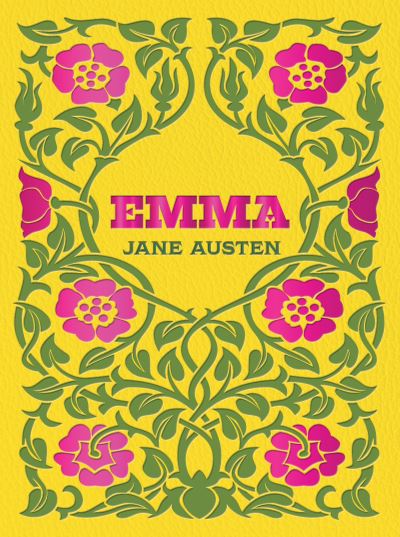LoveReading Says
While Pride and Prejudice may sit at the top of many people’s favourite Jane Austen books, Emma has to be a contender for the title too. For me Emma has a little more bite, it isn’t quite as comfortable a read as Pride and Prejudice, and that makes it more interesting. In terms of lead characters Emma is right up there, she may be headstrong, snobbish, convinced she knows best, yet because of those characteristics, because she isn't perfect, she also feels so very real. Emma is a bright, beautifully written novel with real heart and I love it.
Visit our '50 Classics Everyone Should Read' collection to discover more classic titles.
Visit our 'Women's Words - 60+ works of feminist-minded fiction' to explore our collection of feminist-minded fiction from around the world, and across centuries.
Liz Robinson
Find This Book In
Emma Synopsis
Dive into a world of romance, village life, and even a little silliness in this stunning edition of Jane Austen's timeless novel, Emma.Self-satisfied Emma Woodhouse thinks she is above romance of any kind, but when she decides she is a great matchmaker and sets out to find a wealthy husband for her friend, the sweet yet pitiable Harriet Smith, she crosses paths with the charming Mr. Knightley. Even though Emma tries to ignore her feelings for him, she ends up marrying him and realizes that "Perfect happiness, even in memory, is not common."This collectible edition of Emma features:An elegant faux-leather cover with foil-embossed designsIntroduction by English literature scholar Alison FraserUnabridged textA timeline of the life and times of Jane AustenThis lovely classic is a perfect gift or a wonderful addition to your home library. Other Chartwell Deluxe Editions include: Alice's Adventures in Wonderland, Anne of Green Gables, The Essential Tales and Poems of Edgar Allan Poe, The Iliad, Inferno, Irish Fairy and Folk Tales, The Legend of Sleepy Hollow, Little Women, Meditations, and The Republic.
About This Edition
About Jane Austen
Jane Austen was born on 16 December 1775 at Steventon near Basingstoke, the seventh child of the rector of the parish. She lived with her family at Steventon until they moved to Bath when her father retired in 1801. After his death in 1805, she moved around with her mother; in 1809, they settled in Chawton, near Alton, Hampshire. Here she remained, except for a few visits to London, until in May 1817 she moved to Winchester to be near her doctor. There she died on 18 July 1817.
As a girl Jane Austen wrote stories, including burlesques of popular romances. Her works were only published after much revision, four novels being published in her lifetime. These are Sense and Sensibility (1811), Pride and Prejudice (1813), Mansfield Park (1814) and Emma (1816). Two other novels, Northanger Abbey and Persuasion, were published posthumously in 1818 with a biographical notice by her brother, Henry Austen, the first formal announcement of her authorship. Persuasion was written in a race against failing health in 1815-16. She also left two earlier compositions, a short epistolary novel, Lady Susan, and an unfinished novel, The Watsons. At the time of her death, she was working on a new novel, Sanditon, a fragmentary draft of which survives.
Fellow novelist Katharine McMahon on Jane Austen...
I can't not choose her. And whichever I've read last is always my favourite. The nuance of emotion, the understanding of human nature revealed by Austen constantly delights me. When I reread Sense and Sensibility recently, for the first time Elinor came across as quite prissy and destined to marry a rather spineless husband. I wonder if that was intended?
More About Jane Austen
